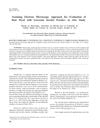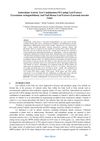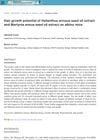2 citations,
November 2019 in “PubMed” Henna significantly promotes hair growth and reduces androgen levels in mice with alopecia.

Henna has many medicinal uses but needs more research to confirm its benefits.
 October 2023 in “International journal of biology, pharmacy and allied sciences”
October 2023 in “International journal of biology, pharmacy and allied sciences” Henna helps wounds heal faster and better.
 22 citations,
July 2017 in “BMC complementary and alternative medicine”
22 citations,
July 2017 in “BMC complementary and alternative medicine” Natural remedies for hair and scalp issues are still widely used in Palestine.
 1 citations,
November 2023 in “Naunyn-Schmiedeberg's archives of pharmacology”
1 citations,
November 2023 in “Naunyn-Schmiedeberg's archives of pharmacology” Henna has potential health benefits and can treat various conditions, but more research is needed to confirm safety and effectiveness.
 July 2023 in “International journal of pharmacognosy and life science”
July 2023 in “International journal of pharmacognosy and life science” The herbal hair oil made from various plants might be a good alternative to synthetic hair loss treatments.
1 citations,
May 2018 in “Research & Reviews: Journal of Herbal Science” The research helps standardize Henna leaf for safe use in traditional medicine and hair care.
 February 2016 in “Online journal of biological sciences”
February 2016 in “Online journal of biological sciences” Henna and honey improved burn healing and hair growth in rabbits.
 July 2022 in “Dermatology practical & conceptual”
July 2022 in “Dermatology practical & conceptual” Henna ointment may help reduce itching and improve wound healing in patients with epidermolysis bullosa.
 8 citations,
November 2019 in “International Journal of Morphology”
8 citations,
November 2019 in “International Journal of Morphology” Henna dye improves hair cuticle and thickness but effects vary by hair type and health.
February 2022 in “Journal of pharmaceutical research international” The herbal baby shampoo is safe, cleans well, and promotes healthy hair.
 January 2012 in “Human health handbooks”
January 2012 in “Human health handbooks” Traditional Indian remedies are used for hair health, but more scientific evidence is needed to prove their safety and effectiveness.
 March 2024 in “International Research Journal of Modernization in Engineering Technology and Science”
March 2024 in “International Research Journal of Modernization in Engineering Technology and Science” The herbal shampoo made hair shinier, smoother, and softer without side effects.
 1 citations,
February 2022 in “International Journal of Health and Pharmaceutical (IJHP)”
1 citations,
February 2022 in “International Journal of Health and Pharmaceutical (IJHP)” Combining cantigi and henna leaf extracts boosts antioxidant activity.
 April 2024 in “Pharmacognosy research”
April 2024 in “Pharmacognosy research” The herbal hair dye with natural ingredients like henna was successfully made and tested, but more research is needed on its effectiveness on different hair colors and benefits.
 July 2023 in “Journal of ayurveda and integrated medical sciences”
July 2023 in “Journal of ayurveda and integrated medical sciences” Keshohills hair oil effectively reduces hair loss and treats dandruff.
 41 citations,
July 2015 in “Current Drug Discovery Technologies”
41 citations,
July 2015 in “Current Drug Discovery Technologies” Some plants may help with hair growth and have fewer side effects than synthetic drugs, but more research is needed to confirm their effectiveness.
 July 2023 in “Journal of Indian System of Medicine”
July 2023 in “Journal of Indian System of Medicine” Ayurveda can help treat premature hair graying with lifestyle changes and herbal remedies.
 July 2024 in “Annals of Phytomedicine An International Journal”
July 2024 in “Annals of Phytomedicine An International Journal” Herbal ingredients like aloe vera and hibiscus can help with hair problems like hair loss and dandruff.
 15 citations,
October 2016 in “Steroids”
15 citations,
October 2016 in “Steroids” Researchers developed a new method to find substances in herbs that can block a specific enzyme linked to hair loss.
 January 2025 in “Journal of Ayurveda and Integrated Medical Sciences”
January 2025 in “Journal of Ayurveda and Integrated Medical Sciences” A holistic lifestyle and ethical practices are key to managing hair disorders and improving well-being.
 March 2007 in “The FASEB Journal”
March 2007 in “The FASEB Journal” Henna mixed with PPD can cause skin reactions, scarring, and a specific type of baldness, and needs more research to understand these effects.
 1 citations,
July 2016 in “Cosmetics”
1 citations,
July 2016 in “Cosmetics” Black henna tattoos can cause severe allergies to hair and textile dyes, and there's a need for greater public awareness and regulation.

Nanocarriers with plant extracts show promise for safe and effective hair growth treatment.
 3 citations,
January 2022 in “Precision medicine and clinical omics”
3 citations,
January 2022 in “Precision medicine and clinical omics” Beta-sitosterol and stigmasterol might help prevent hair loss by blocking a specific enzyme.
 1 citations,
March 2024 in “International Journal of Pharmaceutical Sciences and Drug Research”
1 citations,
March 2024 in “International Journal of Pharmaceutical Sciences and Drug Research” Helianthus annuus and Martynia annua seed oils significantly promote hair growth.
 1 citations,
January 2016 in “Springer briefs in molecular science”
1 citations,
January 2016 in “Springer briefs in molecular science” Natural plant-based substances can be used as effective hair dyes.
 39 citations,
September 2013 in “Journal of Cosmetic Dermatology”
39 citations,
September 2013 in “Journal of Cosmetic Dermatology” Herbs can potentially treat hair loss by inhibiting a key enzyme and promoting hair growth, and deficiencies in zinc, biotin, and iron are linked to hair loss.
 January 2020 in “Journal of Pharmacognosy and Phytochemistry”
January 2020 in “Journal of Pharmacognosy and Phytochemistry” The VCO-based herbal hair tonic is effective, safe for hair loss treatment, and can be mass-produced.
 January 2020 in “Elsevier eBooks”
January 2020 in “Elsevier eBooks” Plant-based chemicals may help hair growth and prevent hair loss but need more research to compete with current treatments.


























